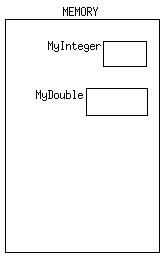
When you declare a variable, the OS allocates space in memory where the value associated with this variable-name would be stored. It's like creating a box in memory and putting a tag with the variable-name written on it.
A picture which shows this

When you actually assign a value to this variable, for example
MyInteger = 67;
MyDouble = 17.32;
the value 67 is written in the memory location associated with MyInteger; and 17.32 in MyDouble.

A pointer is the address of a particluar location in memory. Declaring an integer pointer, for example, does the following:
int *MyIntPtr;


Now we can use MyIntPtr to modify the value that's stored in MyInteger.
#include
void main( ) { int *MyIntPtr; int MyInt; MyInt = 67; MyIntPtr = &MyInt; printf ("\nMyInt = %d\n*MyIntPtr = %d\n", MyInt, *MyIntPtr); *MyIntPtr = 23; printf ("\nMyInt = %d\n*MyIntPtr = %d\n\n", MyInt, *MyIntPtr); }
Here's the output:
UNIX prompt >> a.out